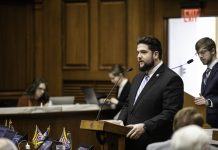Law Students And Attorney Note Challenges To Indiana’s Public Defense System
By Erica Irish
TheStatehouseFile.com
INDIANAPOLIS — West of the Indiana Statehouse, students at Indiana University’s McKinney School of Law often ponder their options for employment after law school.
For law students Tiffany Wire-Costley, 36, and Macie Linn Ellis, 27, this often involves browsing local law bulletins and online job portals, where the two compare salary options, benefits and, of course, the mission behind the practice itself.
And money is in short supply for public defenders, when law students are comparing the positions to job openings at private firms. The average annual salary for public defenders statewide remains 33 percent below the national average of $41,947 per year, according to data gathered by the job search website Indeed.
.
The women certainly don’t lack ambition or passion for public service. They each serve on the boards of two specialized clinics in McKinney’s immersive program. Ellis is a board member of the social work clinic, which provides free services and consultations on child custody disputes and related cases, and Wire-Costley volunteers at a pro bono law clinic on the campus.
Ellis, who is pursuing both a degree in law and a master’s in social work, put it bluntly: “I need to make money. There’s no way around it.â€
The student from Seymour, Indiana, is pursuing a career as a social worker, but she tacked on a law degree to add a second level of expertise to her work. Because she is single and has no children, Ellis said a high salary isn’t a necessity, as long as she can pay off her student debt.
Wire-Costley, a married mother of three, returned to law school after spending several years out of state.
The Indianapolis native returned to her home city and enrolled in McKinney’s program because of its reputation and proximity to the state’s epicenters of public policy.
Wire-Costley benefits from the GI Bill through her husband, a member of the U.S. Air Force. While the bill covers her tuition costs, she said she wants to be paid an equitable salary for her time spent preparing for the practice to best serve her future clients.
Wire-Costley also criticized lawmakers’ inability to advance a measure — House Bill 1453— that would have allowed the Indiana Public Defender Commission to reimburse public defenders for their work on misdemeanor cases.
“The reality is once you have a family and stuff like that, it does matter,†Wire-Costley said. “If you show up in these Statehouse meetings and show that you don’t value what public defenders are asking for and you deny them that, people in law school will know.â€
Carey York, a general practice attorney for Fortville Law Associates in Fortville, Indiana, also spoke to the unavoidable conflict between life responsibilities and a career in public defense.
Until six months ago, York served as a supervisor for the Level 6 felony and misdemeanor division for Marion County’s public defender agency. He started at the county office after completing his law degree at Indiana University’s Maurer School of Law and worked his way up to the supervisory position. Overall, he spent more than a decade at the agency.
“I never envisioned I would be there as long as I was,†York said.
It was time to leave, York said, when his annual salary maxed out at $62,500. The lawyer, who is married, a homeowner and a father to a young son, said this followed a starting salary of $47,000 and four promotions across his 11 years at the agency.
While he applauded his former office’s efforts to raise salaries for first-time defenders and its focus on building an environment motivated by work-life balance, he said there is plenty of room for improvement. But that requires direct investment by the state, he said.
“I can’t imagine there’s anyone making $75 [thousand] at the most,†York said.
York also criticized counties that limit private practice by public defenders, which can provide opportunities for the attorneys to seek out additional cases to compensate for a salary that’s less than ideal.
“It’s difficult to sell that to people,†York said. “You’re saying we need more money and more attorneys, when in the same breath you’re told you’re not allowed to practice privately.â€
Robert Hill, the chief public defender for Marion County, said his office employs recent law school graduates from many states, not just Indiana. He added that his office has made a conscious effort in recent years to raise salaries, mostly to help defenders pay off their law school debts without sacrificing milestones like homeownership or raising a family.
Ultimately, Hill said, securing much needed funds for public defense is a matter of showing respect for the profession and the many sacrifices made by public attorneys.
“Legally, I represent the most in need. The people that are neediest and don’t have the ability to defend themselves against the system,†Hill said. “It’s really important that we as a great state not let them slip through the cracks.â€
FOOTNOTE: Erica Irish is a reporter for TheStatehouseFile.com, a news website powered by Franklin College journalism students.





